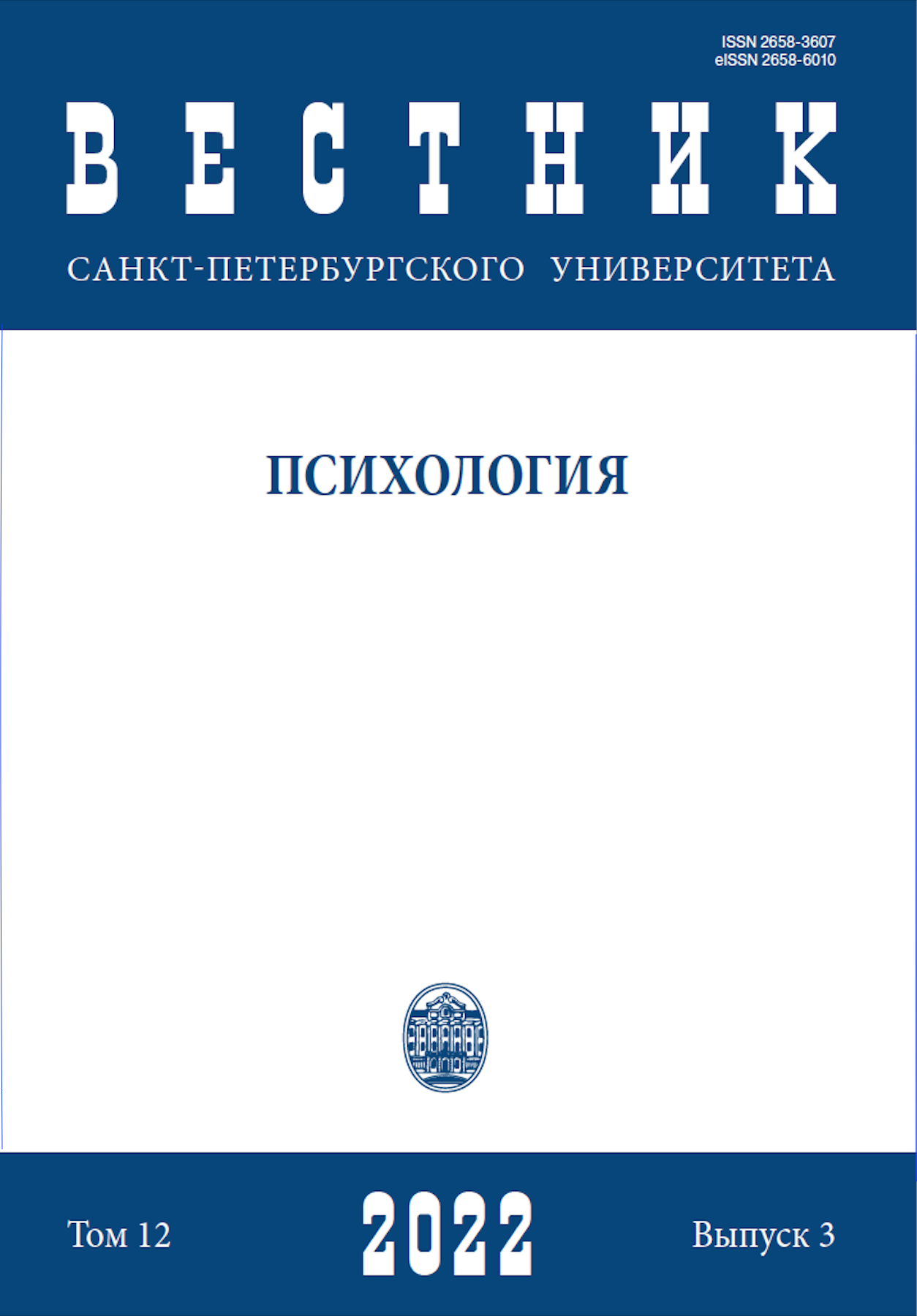The Russian version of “Core Self-Evaluation Scale”: Psychometric testing and prospects of using
DOI:
https://doi.org/10.21638/spbu16.2022.304Abstract
The article presents a theoretical description and psychometric testing of the Russian version of the “Core Self-Evaluation Scale” (CSEs (Ru)). The scale of CSE is an integral indicator that reflects of a personal resources of proactive behavior, as well as a generalized dispositional predictor of job satisfaction and positive self-assessment of the results of activity. The validation and psychometric testing were conducted in several stages, the total number of respondents N=917, who work in Moscow, St Petersburg, Belgorod, and other Russian cities, between the ages of 18 and 60, of which 62% are female and 38% are male. The design of the study included methods: an adapted Russian version of the Core Self-Evaluation scale by Judge et al., 5PFQ as adapted by A.B.Hromov, Generalized self-efficacy scale, Schwarzer, Jerusalem as adapted by V.G.Romek, Rosenberg Self-Esteem Scale, Locus of control as adapted by Kseno- fontova, Gallup’s Q12 Employee Engagement Survey. A two-factor structure of the CSEs (Ru) was identified which includes positive and negative core self-evaluation scales. The CSEs (Ru) demonstrated a satisfactory reliability. The validation testing demonstrated significant correlations with self-esteem, level of subjective control, self-efficacy, neuroticism, и engagement. The CSEs (Ru) includes 10 items and has a sufficient preliminary reliability and validity, making it a useful tool when measuring the core self-evaluation of organizations’ staff. Diversities of the negative core self-evaluation level’s strength within respondents of different age and sex were identified. Сore self-evaluation level is important in staffing work teams of different professional specialization as a predictor of proactive behavior and team resilience. Further research could be focused on the proof of the measurement’s reliability and validity when measuring of proactive behavior in teams.
Keywords:
personnel, core self-evaluation scale, self-efficacy, locus of control, neuroticism, self-esteem, work team
Downloads
References
References
Erikson, M. (2007). The meaning of the future: Toward a more specific definition of possible selves. Review of General Psychology, 11 (4), 348–358. https://doi.org/10.1037/10892680.11.4.348
Khromov, A.B. (2000). Five-factor personality questionnaire: teaching and methodical mean. Kurgan, Kurgan State University Press. (In Russian)
Kolyshkinа, T.B. (2018). Features of professional burnout of BTL-managers. Vestnik YarGU. Ser. Gumanitarnie nauki, 16 (1), 94–98. Available at: http://j.uniyar.ac.ru/index.php/vyrgu/article/view/622 (accessed: 23.12.2020) (In Russian)
Ksenofontova, E.G. (1999). Study of the locus of control: New version of “Level of subjective control”. Psikhologicheskiy zhurnal, 20 (2), 103–114. (In Russian)
Luthans, F., Avolio, B.J., Avey, J.B., Norman, S.M. (2007). Positive psychological capital: Measurement and relationship with performance and satisfaction. Personnel Psychology, 60 (3), 541–572. https://doi.org/10.1111/j.1744-6570.2007.00083.x(2007)
Nasledov, A.D. (2013). IBM SPSS Statistics 20 and AMOS: Professional Statistical Data Analysis. St Petersburg, Piter Publ. (In Russian)
Cheltenham, UK; Northampton, MA: Edward Elgar Publishing. Pujol-Cols, L. (2019). Core self-evaluations, perceived job characteristics and job satisfaction: Evidence from two independent samples of highly skilled Argentinian workers. Revista Colombiana de Psicología, 28 (1), 131–146. https://doi.org/10.15446/rcp.v28n1.70420
Downloads
Published
How to Cite
Issue
Section
License
Articles of "Vestnik of Saint Petersburg University. Psychology" are open access distributed under the terms of the License Agreement with Saint Petersburg State University, which permits to the authors unrestricted distribution and self-archiving free of charge.




